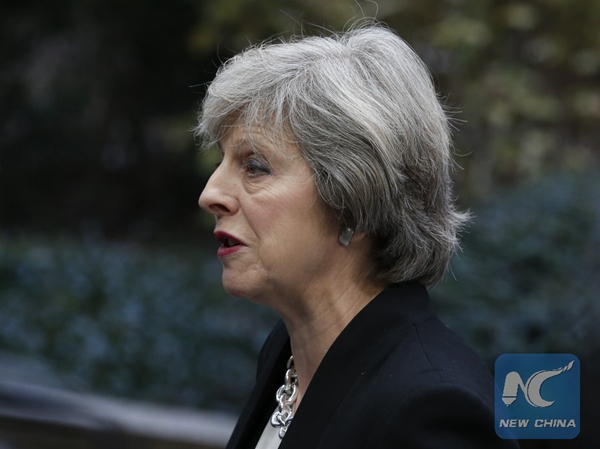Trade and technology trilateral cooperation
- By Sumantra Maitra
 0 Comment(s)
0 Comment(s) Print
Print E-mail China.org.cn, March 29, 2017
E-mail China.org.cn, March 29, 2017
|
|
|
British Prime Minister Theresa May arrives at EU Summit at its headquarters in Brussels, Belgium, Dec. 15, 2016. (Xinhua/Ye Pingfan)(File photo) |
Recently, China central bank governor Zhou Xiaochuan was quoted as saying that globalization is a reality, not a choice. Commenting on the upcoming G20 meeting this July, Zhou said there needed to be a clear understanding about trade and partnerships amidst growing protectionism in the West, especially America.
Around the same time, the former chairman of China's Export-Import Bank said Brexit would provide new opportunities and a new path for free trade between China and the U.K. once the later leaves the EU. Li Ruogu told the Boao Forum held in China's southernmost province of Hainan that there are many opportunities ahead for both China and the U.K.
He also stated something that I vaguely mentioned when Brexit first occurred, that it represents the economic opposite direction to that heralded by President Trump's election, in that those favoring the exit want to diversify trade with other parts of the globe, rather than the kind of sweeping protectionism that is becoming institutionalized in the U.S.
Li mentioned that the U.K. is already a lot more open as a market for investment than the E.U. in general, pointing to the latter's agricultural policies and its disputes with China regarding the steel trade as examples of its protectionist tendencies not unlike those in America.
Regardless of what happens in the Brexit negotiations, about the U.K. on its own will be a much more open market for investment. Li pointed out that financial services are a key sector and that London will continue to remain as an offshore Yuan clearance center. China has also identified Britain as a major promoter of the Belt and Road concept.
This brings up an interesting idea to the front. What if China, Britain and India worked together to buck the trend for increased protectionism and bureaucracy within G20? Allow me to explain.
We all know, there's a growing idea of China and India cooperating in software and technology. Recently there was a paper and a Global Times article that highlighted such an idea. The article noted that China produces a number of engineers; however, they tend to be focused on the heavy industry sector and hardware, whereas India is focused on IT and software.
Indian students are also flocking to Western universities to learn new techniques, while China is facing a shortage of workers and expertise in technology sector. Since the future is automation and technology, Indian software engineers will be able to provide China with a ready supply of technical experts for the foreseeable future and this will successfully merge two complimentary sectors in both the countries.
Similarly, post-Brexit, we have seen UK universities, especially the eight universities that form the elite research-driven Russell Group clamoring for more cooperative research. A prime reason is that the joint funding with EU projects might or might not be facing a cut, but there's a lot of uncertainties.
Hence, India and China, with its increasing investment in the U.K., provide significant opportunities. On one hand, the British education sector will need more students, once the E.U. market is out of the equation. A rising middle class in India and China are more than willing to look for further research and education opportunities, given the political and social situation in America, and might look to Britain as an alternative.
On the other hand, the U.K. industry, since it is primarily finance-based, will have more and more independent opportunities of trade with both India and China, in goods as well as technology training, expertise and share.
A way forward for policy makers to develop a mechanism might include trilateral expertise exchange, which will include information sharing, joint cooperation and research efforts, a joint trade-networking mechanism, and future shared joint projects.
When there're expertise, funding, and talent available, all it sometimes needs is one good idea to bring them together.
Sumantra Maitra is a columnist with China.org.cn. For more information please visit:
http://www.formacion-profesional-a-distancia.com/opinion/SumantraMaitra.htm
Opinion articles reflect the views of their authors only, not necessarily those of China.org.cn.






